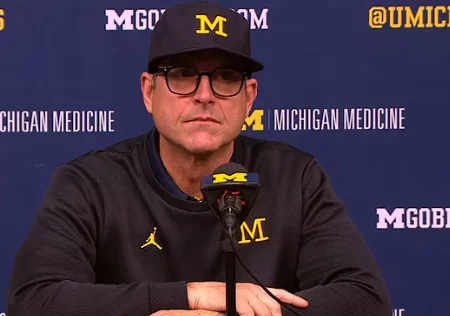It was one of those moments where the room leaned in, waiting for fireworks. After a rough preseason loss with the Chargers at SoFi Stadium, Jim Harbaugh stepped up to the mic. Reporters lobbed the obvious question about the NCAA’s crushing sanctions on Michigan, his old program, and the scandal that’s been hanging over him like a storm cloud.
His answer? Just four words: “Like I said to you last year, not engaging.”
No rant, no tears, no long-winded defense. Just a simple shrug of silence. And somehow, that silence made the biggest statement of all.
A Scandal Bigger Than One Man
To understand why Harbaugh’s response matters, you need to know what Michigan was hit with. The NCAA came down hard:
- Over $20 million in fines.
- Loss of postseason revenue for two straight seasons (2025 and 2026).
- Scholarship cuts and tighter budgets.
- Head coach Sherrone Moore was slapped with a three-game suspension and a two-year show-cause order.
- Harbaugh himself? An additional 10-year show-cause penalty, stacking on top of a prior four-year one. In plain English, that’s a 14-year ban from college sidelines.
- Former staffer Connor Stalions, the face of the sign-stealing scheme, was banned for eight years.
And yet Michigan avoided a postseason ban. The NCAA said it didn’t want to punish current players who had nothing to do with the scheme. The school quickly announced plans to appeal, arguing that parts of the ruling are unfair or exaggerated.
For fans, it’s déjà vu. College football has had its share of scandals, the SMU “death penalty,” USC’s Reggie Bush saga, and Miami’s booster chaos. But Michigan’s sign-stealing debacle cuts differently because of the program’s size and Harbaugh’s polarizing presence.
Why Silence?
So why did Harbaugh decide to clam up instead of firing back? On the surface, it looks dismissive. But dig deeper, and it’s clear this was a calculated move.
- Protecting His Name: Harbaugh has insisted he didn’t know about the operation. Saying more now could poke holes in that defense or give lawyers ammo.
- Keeping the Spotlight Off Him: By refusing to engage, he keeps the focus on Michigan’s legal appeal instead of feeding the media circus.
- Legal Safety Net: With penalties this severe, appeals and investigations will drag on. Any public misstep could come back to bite him. Sometimes silence is safer than the strongest denial.
It’s not unlike Bill Belichick’s famously robotic press conferences, short answers that frustrate the press but prevent adding fuel to the fire.
The Ripple Effect
Harbaugh’s silence doesn’t just affect him. It ripples through Michigan and college football as a whole.
- Michigan’s Uphill Battle: The school is scrambling under probation, scholarship reductions, and budget hits. An appeal is their only lifeline.
- A Bruised Reputation: Some analysts argue the NCAA’s punishment doesn’t line up with past cases. Others believe Michigan got off light without a postseason ban. Either way, their image is tarnished.
- Careers in Limbo: Harbaugh, Moore, and Stalions are effectively exiled from college football. Show-cause penalties are brutal they signal to every school, “hire at your own risk.”
For fans, it’s messy. For recruits, it’s uncertain. And for Harbaugh, who’s now in the NFL, it’s a cloud that will follow him no matter how many games the Chargers win or lose.
History Repeats, But Differently
College football scandals often follow the same script: outrage, denials, punishment, and years of debate over whether justice was served. What makes this one stand out is Harbaugh’s choice to stay quiet.
Back in the ’80s, SMU coaches gave fiery defenses before the NCAA delivered its “death penalty.” When USC got hit for the Reggie Bush case, officials loudly defended their innocence. Harbaugh? He’s writing a new playbook—silence, restraint, and letting lawyers, not emotions, do the talking.





